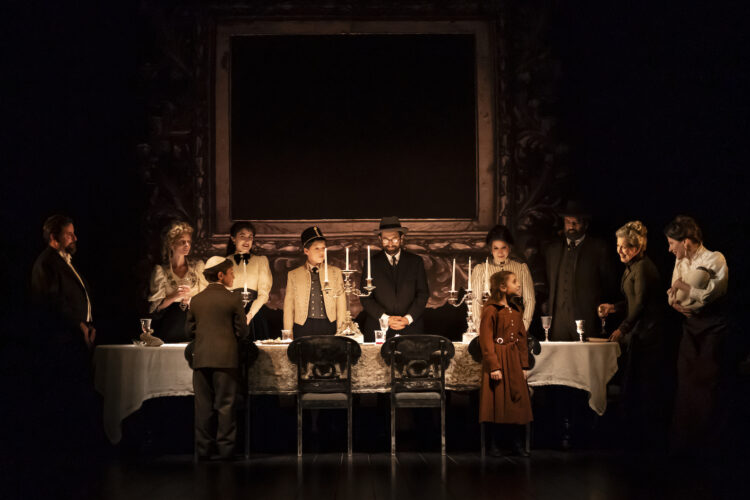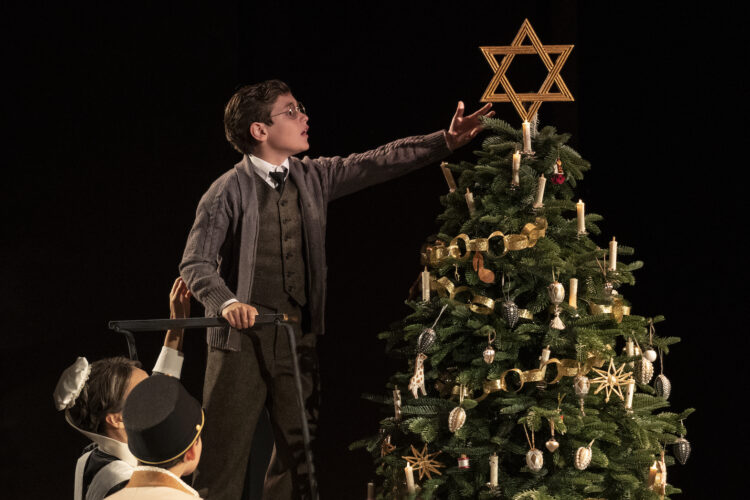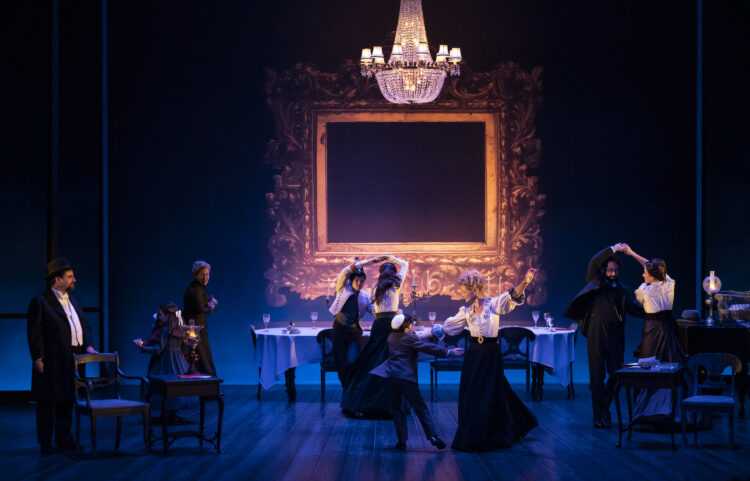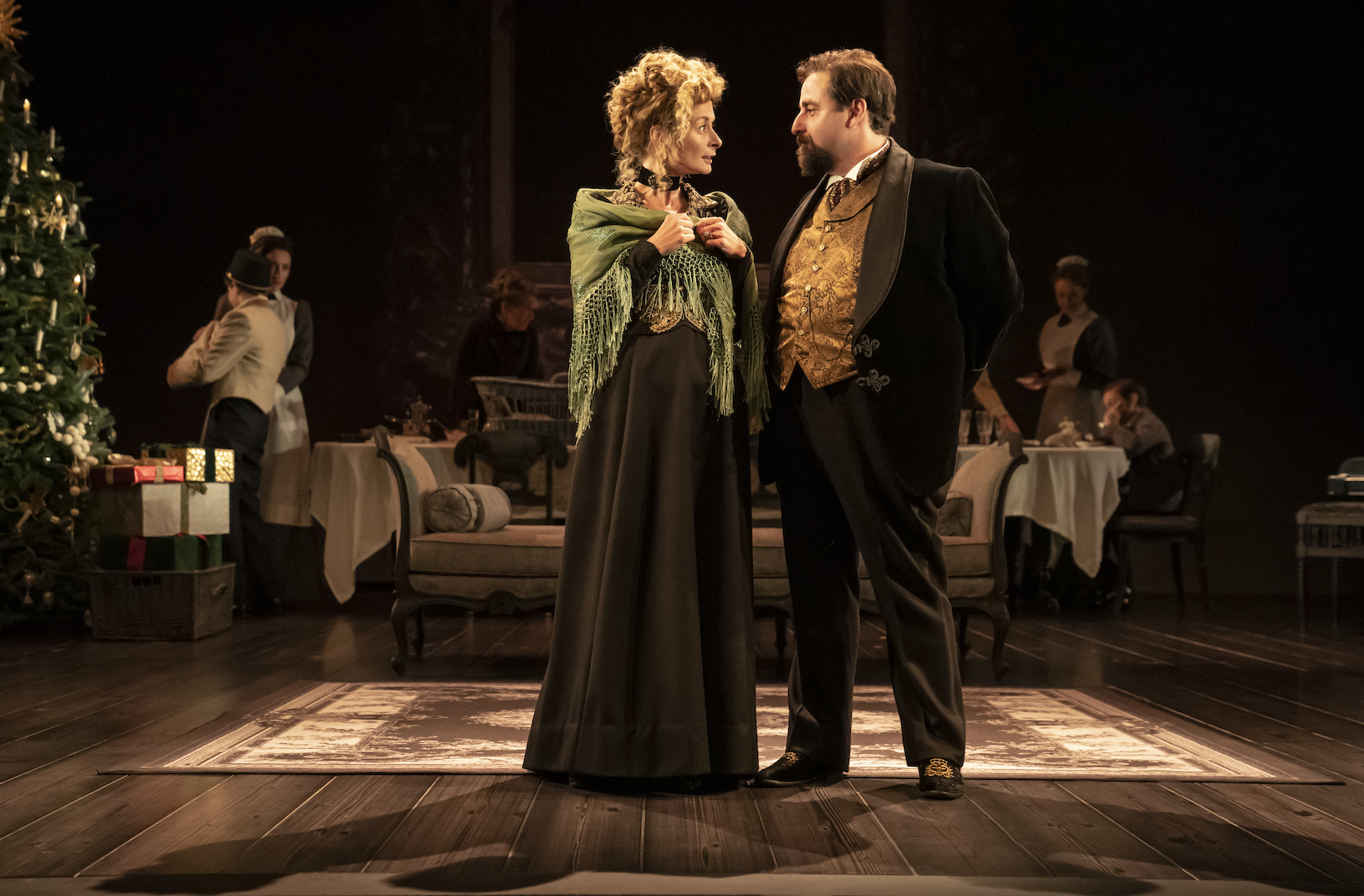*****/***** (five out of five stars)
The 2022-23 New York Theater season is finally upon us—one that we hope will remain uninterrupted by Covid lockdowns—and already there’s an interesting thematic pattern emerging. Though plays about anti-Semitism and the Holocaust have long been a part of the theater world’s rich tapestry, this year there is an usually abundant number of such plays, all well-made and providing new insights. From David Straithern’s utterly brilliant one-man show, Remember This: The Lesson of Jan Karski, the story of a Polish diplomat who bears witness to the horrors of Nazi Germany and conveys his eyewitness accounts to FDR; to This Beautiful Future, a story of young love between a French collaborator and a young Nazi soldier that points to the banality of evil meet-cute; and, most recently, Sir Tom Stoppard’s latest (and possibly final) masterpiece, Leopoldstadt, now playing at the Longacre Theatre on Broadway through March.

It’s difficult to surmise the reasons behind the sudden emergence of so many Holocaust-era productions, but perhaps one could point to the alarming rise of anti-Semitism (in both attitude and deed) in the US since the political upheaval of 2016. Indeed, even the latest Ken Burns series on PBS, “The US and the Holocaust” is calling for a renewed awareness of America’s culpability in that awful era. But it’s Stoppard’s Leopolodstadt that frames the story most ably. The story of two Viennese families viewed in five different, significant years (1899, 1900, 1924, 1938 and 1955) allows us to witness the deterioration and destruction of a happy, upper-class household in the most devastating manner possible.
The play’s title refers to an erstwhile Jewish neighborhood in Vienna, Austria. The two families, stand-ins for Stoppard’s own (though his family actually came from what was then Czechoslovakia) in this semi-autobiographical story, both ethnically Jewish, live in Leopoldstadt in an opulent, high-ceilinged apartment. The play’s sole setting is the large, lavish family room which changes styles over the different eras represented (gorgeously designed by Richard Hudson). It opens as the extended families celebrate Christmas—for the Merz family are mixed, Jewish and gentile (and not terribly strict in either). To drive the point home, their young son inadvertently tops the Christmas tree with a Star of David, which merely amuses all in attendance. Grandma Emilia (Betsey Aidem) scoffs, “Oy . . . Poor boy, baptized and circumcised in the same week, what can you expect?” But despite their emphatically passive Jewishness, it nonetheless eventually spells their doom.

And so we witness a merry extended family, watching them benignly argue about philosophy, mathematics and politics or celebrating holidays or even coping with petty betrayals or infidelities. Gretl Merz (an excellent Faye Castelow) becomes romantically entangled with Fritz (Arty Froushan), a young Austrian officer, every bit a chiseled Aryan übermensch, after accompanying her niece Hannah (Colleen Litchfield) on a date with him. In an odd twist, her husband Hermann (a terrific David Krumholtz) coincidentally has an altercation with Fritz, challenging him to a duel, which Fritz declines because Hermann, as a Jew, cannot have any honor to defend! Moments like these reveal the deep, unpleasant fissures in an otherwise “civilized” society, ones that will eventually rip open with brute force.
It comes as no surprise, nor is it a spoiler, then, that the family, despite surviving World War I mostly intact, is on a slow death march to the horrors of World War II. And, when we join them in 1938, it is Kristallnacht and they are being brutally forced from their Nazi-confiscated home.
In the 1938 segment of the play, arrangements are made for one small portion of the family to be spirited away to England. During the gestapo invasion of the house, their small boy, Leopold, eight years old, cuts his hand on a broken teacup and an older relative stitches, painfully, his wound.

Memory of the event, in 1955, triggers an older Leo, now an English citizen and successful comic writer, with an overpowering Proustian moment of sense-memory; and the man who’d forgotten this chapter of his history (as young children are prone to do with traumatic episodes) is overwhelmed by the moment. Very much like Stoppard, who was only told of his beginnings and his Jewish family at the age of 55, the adult Leo encounters quite unexpectedly his deep connection to one of history’s ugliest moments.

Leopoldstadt is less a plot-driven play than a soaring epic and history lesson writ-small. Stoppard’s research, as is his wont, is exemplary and he regurgitates well-documented historical moments in an easy-to-consume manner; and at two intermission-less hours, it flies by. But those who have the patience for long, complex plays may feel somewhat cheated, feeling that it could have encompassed more and better filled out multiple, individual story arcs (not unlike his three-part 2002 Coast of Utopia epic). I would easily have been pleased to sit through a four-hour version of a production of Leopolodstadt, but alas that does not fit the Broadway mold; and this is a play that will likely garner multiple Tony nominations, as it is already an Olivier Award winning play from its 2020 run in London.
Make no mistake, the play is complex and laden with such detail that multiple viewings would only be advantageous and clarifying (it helps to have some foreknowledge of the play), but it can be thoroughly enjoyed merely on its theatrical merits, from the aforementioned set, to Bridget Reiffenstuell’s sumptuous, period-perfect costumes, to Neil Austin’s gorgeous, first-rate lighting and Patrick Marber’s tight, outstanding direction. Additional exceptional performances by the cast of 38 (!), particularly Brandon Uranowitz as math-obsessed Ludwig (and later older Nathan), Jenna Augen as Aunt Rosa circa 1955 and Seth Numrich as the adult Jacob make for a tight, perfectly delivered production.
The confluence of all these plays about the Holocaust, particularly Leopoldstadt, seems to be sending one clear message: that the widely held belief that “it can’t happen here” or “it can’t happen again” is wildly misguided. Stoppard shows us how it started, and how it happened to nice people like you and me. It can happen here, he tells us by this example. Pay heed.
Leopoldstadt. Through March 12, 2023 at the Longacre Theater (220 West 48th Street, between Broadway and Eighth Avenue). Two hours, ten minutes with no intermission. www.leopoldstadtplay.com
Photos: Joan Marcus












